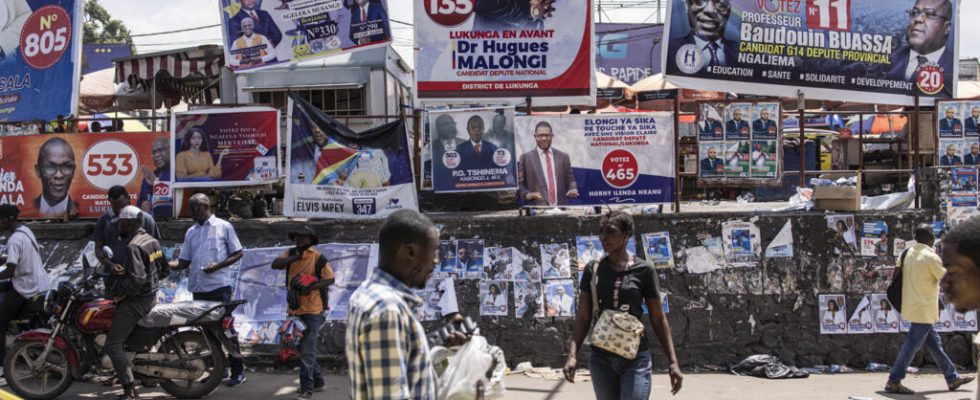It is the last day of campaigning in the Democratic Republic of Congo. The country must vote this Wednesday, December 20 for general elections: presidential, legislative and local. The campaign ends at midnight and the various presidential candidates were still in the field today.
5 mins
The Congolese presidential candidates were on the ground for this final stretch of the campaign. President Félix Tshisekedi held his last rally this Monday in Kinshasa, in the commune of Ndjili, Sainte-Thérèse district.
Moïse Katumbi, his main rival, was in the province of Haut Katanga with a last meeting in Kipuchi, a border town with the Zambia. During the event, he asked voters to closely monitor the vote and the counting, even if they have to sleep there. The other big rival, Martin Fayulu, was in the province of Sankuru, in Lodja, then in the province of Lomami. And finally, Denis Mukwege, whose campaign was much more discreet, due to lack of resources, was like Tshisekedi, in Kinshasa. He spoke on a national radio, accusing certain candidates of being complicit with the country’s aggressors, reports our special correspondent in Kinshasa, Alexandra Brangeon.
Read alsoElections in the DRC: in Kinshasa, last campaign meeting for outgoing President Félix Tshisekedi
Tensions
This last week of the campaign was marked by strong tension and incidents between supporters of the different candidates. There are incidents almost every day, which are more or less important, but they indicate that the tension is quite high. On Saturday, for example, supporters of the UDPS from Felix Tshisekedi set vehicles on fire to protest against the campaign Moses Katumbi in Lubumbashi. Other events also took place in Muanda against the Katumbi meeting.
See alsoElections in the DRC: an XXL ballot
There were also clashes in Kinshasa this weekend between UDPS activists and those of Martin Fayulu. And then there are the candidates who sometimes use bellicose rhetoric during their meetings, verbally attacking their opponent.
Rallies
In addition to divisions, the electoral campaign was also marked by numerous rallies. There were initially 26 candidates, but two days before the election, there were only 19 left. Seven candidates voluntarily left this race, all due to rallies, in favor of the outgoing head of state Félix Tshisekedi or the opponent Moïse Katumbi.
Three small candidates have joined the ranks of Félix Tshisekedi. They are Noël Tshiani, Joëlle Bile and Patrice Majondo. These are small candidacies, because these three political figures do not currently hold office. Given that the presidential camp is already united for these elections, we should not expect any major rallies. The unions were made upstream with the deputy prime ministers Vital Kamerhe and Jean-Pierre Bemba or even with the presidents of the Senate and the National Assembly Modeste Bahati and Christophe Mboso.
Opposite, the opposition arrived more divided. The joint candidacy desired by many did not take place. Moïse Katumbi obtained some important rallies such as the former Prime Minister Matata Ponyo, the Kasai MP Delly Sesanga, the former MP Franck Diongo and the businessman Seth Kikuni. But there will have been no alliance with the two other heavyweights: namely the unsuccessful 2018 candidate Martin Fayulu and the Nobel Peace Prize winner Denis Mukwege.
Finally, it should also be noted that although 19 candidates are still in the running, the ballot paper was frozen on November 18 with the 26 names. Voters can therefore physically vote for a candidate who has withdrawn and their votes will not go to the candidate who joined. In 2018, for example, Vital Kamerhe who withdrew in favor of Félix Tshisekedi still came 5th out of 21.
Concerns about logistics
The Céni assures that everything will be ready on Wednesday. Last week, the government asked the UN Security Council if MONUSCO (the UN mission in the DRC) could assist it with the transport of equipment. The country is four times the size of France (2.3 million km2) with very few roads, often in poor condition. And some regions, like Ecuador, are difficult to access.
The UN Security Council responded positively, but on the ground, we do not know what means were made available to the CENI. On Sunday, the Congolese government announced an agreement with Egypt which agreed to provide two Hercule C30 planes, large carriers which can transport up to 11 tonnes of material. It is not known if they have arrived yet. This Monday, two helicopters loaned by Congo-Brazzaville also arrived in the DRC, details our correspondent in Kinshasa, Patient Ligodi.
Will all so-called sensitive material such as ballots or minutes be available by Wednesday, the day of the vote? Some analysts and observers are doubtful. A few days ago, people close to the presidency raised the possibility for certain isolated voting centers – and which would not have received all the material – to vote 2 or 3 days late. But in any case, there will be no postponement for these elections, affirm the Ceni and the government.
Read alsoElections in the DRC: will electoral materials be deployed on time throughout the country?
